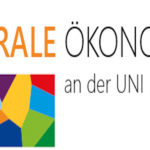Plurale Okonomik | University of Siegen
The Plural Economics masterprogram is aimed at students who want to critically reflect on their own understanding of economics and want to broaden their thinking. The program offers two specializations: Political Economy as well as Management and Environmental design.
How does the programme provide content to ensure students achieve an understanding of a reasonably diverse set of perspectives on understanding economies?
Students engage with and learn about various schools of thought in business administration and economics, which provide different answers to the pressing social issues of the day - from globalization to processes of sustainability to corporate social responsibility. At the same time, students are allowed and encouraged to develop innovative ideas on their own. Teaching is also pluralist. In the first semester, students take different courses which ensure they learn more about the wide range of schools of thoughts and methodologies within economics and the social sciences. To provide a diverse set of perspectives on these topics, it is ensured that different external lectures are an integral part of the master program.
How does the programme ensure students understand the interaction between economic and ecological systems?
The reflection and discussion of the interaction between economics and its environment is the key characteristic of the one of our two foci you can choose within the master program: “Management und Mitweltgestaltung” (“Management and Environmental design”). Even in the other focus (“Politische Ökonomie”, “Political Economy”) there are several mandatory and optional courses which ensure that the interactions between the economic, the ecological, and the social systems are discussed and taught. This approach involves the application of various schools of thought like Marxist theories, feminist economics, Austrian school of economics, Institutional economics, Post-Growth and more.
How does the programme ensure students understand how to critically explore real-world evidence, both qualitative and quantitative?
During the first semester courses in philosophy of economics and in empirical methods are part of the students scedule. A key aspect here is to ensure that students learn the advantages and limitations of different methodologies. This pluralistic approach empowers the students to find the appropriate method for the economic problem at hand and enables them to adjudicate which methodologies should be employed. Further it is possible for students to choose methodological courses which focus on qualitative or quantitative approaches. Yet, courses and lectures also focus on mixed-methods-approaches and apply them. This offers students the possibility not only to learn about qualitative or quantitative approaches but also about ways to synthesize them. Hence students are free to employ different approaches within their own research.
What pedagogical approaches does the programme use to ensure that students examine the historical context, assumptions and values in all economic thinking?
When teaching scientific pluralism disagreements arise naturally. In our program we see these as a chance to learn and better understand and challenge our own assumptions and values but also the underlying ideas of the different economic schools of thought . This examination of different schools of thought is embedded in the historical context of their emergence. Furthermore, it becomes part of the learning experience due to the diverse backgrounds of students and lectures.
How does the department ensure that the teaching culture and capacity to deliver economic pluralism are continually improving?
When improving teaching and the organization of contents, communication is the backbone of a solution-oriented approach. Therefore, professors and students meet once per semester to discuss possible improvements and exchange experiences. Where possible, teaching and examination is set with respect to student interests and learning habits. This is meant to foster students’ intrinsic motivation; at the same time, this is also supposed to have a beneficial effect on the quality of exams. As a positive side effect to this, professors are encouraged to develop and experiment with new forms of examinations. This enables students to think in a solution-oriented way and work on examinations that resemble problems they will have to solve in their future careers.
Country:
Germany
University:
University of Siegen
Course name:
Plurale Okonomik
Department/school:
Department of Economics
Course level:
Taught Masters
Course language:
German

 all programmes
all programmes